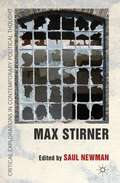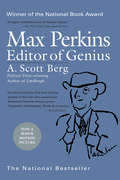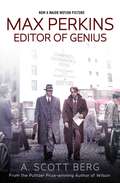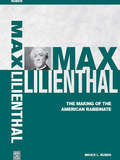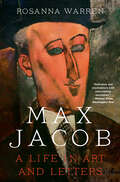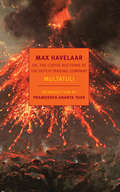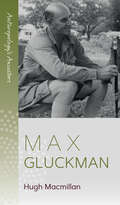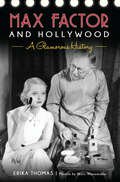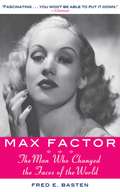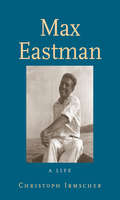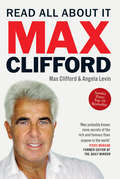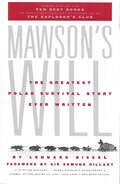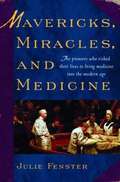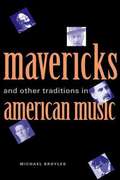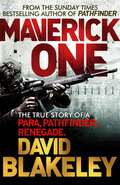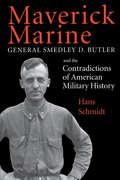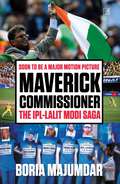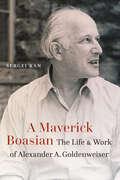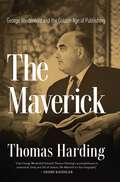- Table View
- List View
Max Stirner
by Saul NewmanMax Stirner was one of the most important and seminal thinkers of the mid-nineteenth century. He exposed the religiosity behind secular humanism and rationalism, and the domination of the individual behind liberal modes of politics. This edited collection explores Stirner's radical and contemporary importance as a political theorist.
Max Perkins: Editor Of Genius
by A. Scott BergThe National Book Award winner from the #1 New York Times bestselling author, A. Scott Berg. The talents he nurtured as an editor were known worldwide: F. Scott Fitzgerald, Ernest Hemingway, Thomas Wolfe, and numerous others. But Maxwell Perkins remained a mystery, a backstage presence who served these authors not only as book editor extraordinaire but also as critic, career manager, money-lender, psychoanalyst, father-confessor, and friend. This outstanding biography, a winner of the National Book Award, is the first to explore the fascinating life of this editor extraordinaire--in both the professional and personal domains. It tells not only of Perkin's stormy marriage, endearing eccentricities, and secret twenty-five-year romance with Elizabeth Lemmon, but also of his intensely intimate relationships with leading literary lights of the twentieth century. It is, in the words of Newsweek, "an admirable biography of a wholly admirable man."
Max Perkins
by A. Scott BergThe talents Maxwell Perkins nurtured were known worldwide: F. Scott Fitzgerald, Ernest Hemingway, Thomas Wolfe among numerous others. But the man himself remained a mystery, a backstage presence who served these authors not only as editor but as critic, career manager, moneylender, psychoanalyst, confessor and friend. This outstanding biography, a winner of the National Book Award, is the first to explore the fascinating life of this editor extraordinaire in both professional and personal domains. It tells not only of Perkins' stormy marriage and secret twenty-five-year romance with Elizabeth Lemmon, but also of his intensely intimate relationships with the leading literary lights of the twentieth century.
Max Lilienthal: The Making of the American Rabbinate
by Bruce L. RubenExplores the life and thought of Rabbi Max Lilienthal, who created a new model for the American rabbinate.
Max Jacob: A Life In Art And Letters
by Rosanna WarrenA comprehensive and moving biography of Max Jacob, a brilliant cubist poet who lived at the margins of fame. Though less of a household name than his contemporaries in early twentieth century Paris, Jewish homosexual poet Max Jacob was Pablo Picasso’s initiator into French culture, Guillaume Apollinaire’s guide out of the haze of symbolism, and Jean Cocteau’s loyal friend. As Picasso reinvented painting, Jacob helped to reinvent poetry with compressed, hard-edged prose poems and synapse-skipping verse lyrics, the product of a complex amalgamation of Jewish, Breton, Parisian, and Roman Catholic influences. In Max Jacob, the poet’s life plays out against the vivid backdrop of bohemian Paris from the turn of the twentieth century through the divisions of World War II. Acclaimed poet Rosanna Warren transports us to Picasso’s ramshackle studio in Montmartre, where Cubism was born; introduces the artists gathered at a seedy bar on the left bank, where Max would often hold court; and offers a front-row seat to the artistic squabbles that shaped the Modernist movement. Jacob’s complex understanding of faith, art, and sexuality animates this sweeping work. In 1909, he saw a vision of Christ in his shabby room in Montmartre, and in 1915 he converted formally from Judaism to Catholicism—with Picasso as his godfather. In his later years, Jacob split his time between Paris and the monastery of Benoît-sur-Loire. In February 1944, he was arrested by the Gestapo and sent to Drancy, where he would die a few days later. More than thirty years in the making, this landmark biography offers a compelling, tragic portrait of Jacob as a man and as an artist alongside a rich study of his groundbreaking poetry—in Warren’s own stunning translations. Max Jacob is a nuanced, deeply researched, and essential contribution to Modernist scholarship.
Max Horkheimer and the Foundations of the Frankfurt School
by John AbromeitThis book is the first comprehensive intellectual biography of Max Horkheimer during the early and middle phases of his life (1895-1941). Drawing on unexamined new sources, John Abromeit describes the critical details of Horkheimer's intellectual development. This study recovers and reconstructs the model of early Critical Theory that guided the work of the Institute for Social Research in the 1930s. Horkheimer is remembered primarily as the co-author of Dialectic of Enlightenment, which he wrote with Theodor W. Adorno in the early 1940s. But few people realize that Horkheimer and Adorno did not begin working together seriously until the late 1930s or that the model of Critical Theory developed by Horkheimer and Erich Fromm in the late 1920s and early 1930s differs in crucial ways from Dialectic of Enlightenment. Abromeit highlights the ways in which Horkheimer's early Critical Theory remains relevant to contemporary theoretical discussions in a wide variety of fields.
Max Havelaar: Or, the Coffee Auctions of The Dutch Trading Company (Library Of The Indies)
by MultatuliA fierce indictment of colonialism, Max Havelaar is a masterpiece of Dutch literature based on the author's own experience as an adminstrator in the Dutch East Indies in the 1850s.A brilliantly inventive fiction that is also a work of burning political outrage, Max Havelaar tells the story of a renegade Dutch colonial administrator’s ultimately unavailing struggle to end the exploitation of the Indonesian peasantry. Havelaar’s impassioned exposé is framed by the fatuous reflections of an Amsterdam coffee trader, Drystubble, into whose hands it has fallen. Thus a tale of the jungles and villages of Indonesia is interknit with one of the houses and warehouses of bourgeois Amsterdam where the tidy profits from faraway brutality not only accrue but are counted as a sign of God’s grace. Multatuli (meaning “I have suffered greatly”) was the pen name of Eduard Douwes Dekker, and his novel caused a political storm when it came out in Holland. Max Havelaar, however, is as notable for its art as it is for its politics. Layering not only different stories but different ways of writing—including plays, poems, lists, letters, and a wild accumulation of notes—to furious, hilarious, and disconcerting effect, this masterpiece of Dutch literature confronts the fixities of power with the protean and subversive energy of the imagination.
Max Gluckman (Anthropology's Ancestors #6)
by Hugh MacmillanThis handy, concise biography describes the life and intellectual contribution of Max Gluckman (1911-75) who was one the most significant social anthropologists of the twentieth century. Max Gluckman was the founder in the 1950s of the Manchester School of Social Anthropology. He did fieldwork among the Zulu of South Africa in the 1930s and the Lozi of Northern Rhodesia/Zambia in the 1940s. This book describes in detail his academic career and the lasting influence of his Analysis of A Social Situation in Modern Zululand (1940-42) and of his two large monographs on the legal system of the Lozi. From the Introduction: Max Gluckman was the most influential of a group of social anthropologists who emerged from South Africa during the 1930s into what was essentially a new academic discipline. His description and analysis of events in real time implied a rejection of contemporary social anthropological practice, of the ‘ethnographic present’, and of hypothetical or conjectural reconstructions and an acceptance of the need to study ‘primitive’ societies in the context of the modern world.
Max Factor and Hollywood: A Glamorous History
by Erika ThomasThe story of the makeup artist who changed the film industry—and the world of modern cosmetics. Includes photos. When Polish wigmaker and cosmetician Max Factor arrived in Los Angeles at the dawn of the motion picture industry, &“make-up&” had been associated only with stage performers and ladies of the oldest profession. Appalled by the garish paints worn by actors, Factor introduced the first &“flexible&” greasepaint for film in 1914. With a few careful brush strokes, a lot of innovation, and the kind of luck that can happen only in Hollywood, Max Factor changed the meaning of glamour. His innovations can be experienced in every tube of lipstick, palette of eye shadow, and bottle of nail lacquer used today. Join author Erika Thomas as she reveals the makeup guru's expert beauty tips and the story of how he created the most iconic golden-era looks that are as relevant today as they were nearly a century ago.
Max Factor: The Man Who Changed the Faces of the World
by Fred E. BastenNice women never wore makeup. Even the word was taboo in polite society--until Max Factor entered the scene. Born in Poland in 1877, Factor worked as a beautician for the Russian royal family, the Romanovs. In 1904, he fled to America, where he opened a cosmetics store in Los Angeles. Creating makeup originally for silent films, then the talkies, and, ultimately, color motion pictures, Factor designed looks for Katharine Hepburn, Rita Hayworth, Bette Davis, and countless other beauties of the day. Soon women everywhere wanted to look like their favorite glamorous stars, and Factor was there to help, bringing his innovative cosmetics to the general public. He revolutionized the world of beauty by producing many firsts: false eyelashes, lip gloss, foundation, eye shadow, the eyebrow pencil, concealer, wand-applicator mascara, and water-resistant makeup. A true innovator, he also introduced the concept of color harmony and the celebrity-endorsed cosmetics advertising that forms the glamorous backbone of the modern industry. Max Factor was the father of modern makeup. This is his extraordinary story.
Max Eastman: A Life
by Christoph IrmscherThe definitive biography of a radical activist and intellectual Max Eastman (1883–1969) was a prolific writer, radical, and public intellectual who helped shape the twentieth century. While researching this masterful work, acclaimed biographer Christoph Irmscher was granted unprecedented access to the Eastman family archive, allowing him to document little-known aspects of the famously handsome and charismatic radical. Considered one of the “hottest radicals” of his time, Eastman edited two of the most important modernist magazines, The Masses and The Liberator, and campaigned for women’s suffrage and world peace. A fierce critic of Joseph Stalin, Eastman befriended and translated Leon Trotsky and remained unafraid to express unpopular views, drawing criticism from both conservatives and the Left. Set against the backdrop of several decades of political and ideological turmoil, and interweaving Eastman’s singular life with stories of the fascinating people he knew and loved, this book will have broad interdisciplinary appeal in twentieth-century history and politics, intellectual history, and literary studies.
Max Clifford: Read All About It
by Angela Levin Max Clifford'Max knows more secrets of the rich and famous than anyone in the world'Piers MorganMax Clifford is the media guru everyone calls when they want to know about a celebrity story or a celebrity's relationship with the media. Starting out as a junior member of the press department at EMI, he has become one of the most influential figures in today's society, and a household name. What is less known is the other side to Max: the stories he keeps out of the papers; his stand against corruption; his mischievous sense of humour; his dedication to helping people from all walks of life;his love for his wife of nearly forty years who tragically died of cancer; and his devotion to his daughter Louise who, at six,was diagnosed with juvenile rheumatoid arthritis and is permanently disabled. The essential memoir for those interested in both PR and celebrity.
Max and Mia's Story (Thrown Away Children Ser.)
by Louise AllenFrom the bestselling author of the Thrown Away Children series comes another heartbreaking story of life in foster care.Parents Angelina and Ben exist in enviable luxury: not just wealth, success and a gorgeous home, but a loving relationship and beautiful twin babies to complete the perfect family.But having it all means that you have the most to lose. And when cracks begin to appear things fall apart at a shocking pace; and it's twins Max and Mia who suffer the most.Money isn't enough to paper over the problems in this extraordinary and heartbreaking story. It is a foster-caring experience like no other, and one which tests Louise's emotional strength to the core.
Max and Mia's Story (Thrown Away Children Ser.)
by Louise AllenFrom the bestselling author of the Thrown Away Children series comes another heartbreaking story of life in foster care.Parents Angelina and Ben exist in enviable luxury: not just wealth, success and a gorgeous home, but a loving relationship and beautiful twin babies to complete the perfect family.But having it all means that you have the most to lose. And when cracks begin to appear things fall apart at a shocking pace; and it's twins Max and Mia who suffer the most.Money isn't enough to paper over the problems in this extraordinary and heartbreaking story. It is a foster-caring experience like no other, and one which tests Louise's emotional strength to the core.
Max and Mia's Story (Thrown Away Children Ser.)
by Louise AllenFrom the bestselling author of the Thrown Away Children series comes another heartbreaking story of life in foster care.Parents Angelina and Ben exist in enviable luxury: not just wealth, success and a gorgeous home, but a loving relationship and beautiful twin babies to complete the perfect family.But having it all means that you have the most to lose. And when cracks begin to appear things fall apart at a shocking pace; and it's twins Max and Mia who suffer the most.Money isn't enough to paper over the problems in this extraordinary and heartbreaking story. It is a foster-caring experience like no other, and one which tests Louise's emotional strength to the core.
Mawson's Will: The Greatest Survival Story Ever Written
by Sir Edmund Hillary Lennard BickelMAWSON'S WILL is the dramatic story of what Sir Edmund Hillary calls "the most outstanding solo journey ever recorded in Antarctic history." For weeks in Antarctica, Douglas Mawson faced some of the most daunting conditions ever known to man: blistering wind, snow, and cold; loss of his companion, his dogs and supplies, the skin on his hands and the soles of his feet; thirst, starvation, disease, snowblindness - and he survived. Sir Douglas Mawson is remembered as the young Australian who would not go to the South Pole with Robert Scott in 1911, choosing instead to lead his own expedition on the less glamorous mission of charting nearly 1,500 miles of Antarctic coastline and claiming its resources for the British Crown. His party of three set out through the mountains across glaciers in 60-mile-per-hour winds. Six weeks and 320 miles out, one man fell into a crevasse, along with the tent, most of the equipment, all of the dogs' food, and all except a week's supply of the men's provisions.Mawson's Will is the unforgettable story of one man's ingenious practicality and unbreakable spirit and how he continued his meticulous scientific observations even in the face of death. When the expedition was over, Mawson had added more territory to the Antarctic map than anyone else of his time. Thanks to Bickel's moving account, Mawson can be remembered for the vision and dedication that make him one of the world's great explorers."A riveting account . . . makes Mawson's achievement a symbol of the desire to live." -- The New York Times Book Review"A powerful reading experience." -- Publishers WeeklyFrom the Trade Paperback edition.
Mavericks of the Sky: the First Daring Pilots of the U.S. Air Mail
by Barry Rosenberg Catherine MacaulayHistory of the introduction of the air mail service, and biographies of the first pilots.
Mavericks, Miracles, and Medicine: The Pioneers Who Risked Their Lives to Bring Medicine into the Modern Age
by Julie M. FensterMavericks, Miracles, and Medicine brings to life stories of the pioneering geniuses, eccentrics, and freethinkers who moved beyond the conventions of their day at great personal risk and often with tragic results to push forward the boundaries of modern medicine.
Mavericks and Other Traditions in American Music
by Michael BroylesFrom colonial times to the present, American composers have lived on the fringes of society and defined themselves in large part as outsiders. In this stimulating book Michael Broyles considers the tradition of maverick composers and explores what these mavericks reveal about American attitudes toward the arts and about American society itself. Broyles starts by examining the careers of three notably unconventional composers: William Billings in the eighteenth century, Anthony Philip Heinrich in the nineteenth, and Charles Ives in the twentieth. All three had unusual lives, wrote music that many considered incomprehensible, and are now recognized as key figures in the development of American music. Broyles goes on to investigate the proliferation of eccentric individualism in all types of American music--classical, popular, and jazz--and how it has come to dominate the image of diverse creative artists from John Cage to Frank Zappa. The history of the maverick tradition, Broyles shows, has much to tell us about the role of music in American culture and the tension between individualism and community in the American consciousness.
Maverick One: The True Story of a Para, Pathfinder, Renegade
by David BlakeleyThe explosive sequel to the bestselling PATHFINDER.For the first time ever an elite British operator tells the gruelling story of his selection into the Pathfinders - Britain's secret soldiers. Pathfinder selection is a brutal physical and psychological trial lasting many weeks. It rivals that of the SAS and takes place over the same spine-crushing terrain, in the rain-and-snow-lashed wastes of the Welsh Mountains. For two decades no one has been able to relate the extraordinary trials of British elite forces selection - until now.Captain David Blakeley goes on from completing selection to serve with the Pathfinders in Afghanistan post 9/11, where he had a gun held to his head by Al Qaeda fighters. From there he deploys to Iraq, on a series of dramatic behind- enemy-lines missions - wherein he and his tiny elite patrol are outnumbered, outgunned and trapped. Maverick One is unique and extraordinary, chronicling the making of a warrior. It culminates in Blakeley fighting back to full recovery from horrific injuries suffered whilst on operations in Iraq, to go on to face SAS selection.
Maverick One: The True Story of a Para, Pathfinder, Renegade
by David BlakeleyThe explosive sequel to the bestselling PATHFINDER.For the first time ever an elite British operator tells the gruelling story of his selection into the Pathfinders - Britain's secret soldiers. Pathfinder selection is a brutal physical and psychological trial lasting many weeks. It rivals that of the SAS and takes place over the same spine-crushing terrain, in the rain-and-snow-lashed wastes of the Welsh Mountains. For two decades no one has been able to relate the extraordinary trials of British elite forces selection - until now.Captain David Blakeley goes on from completing selection to serve with the Pathfinders in Afghanistan post 9/11, where he had a gun held to his head by Al Qaeda fighters. From there he deploys to Iraq, on a series of dramatic behind- enemy-lines missions - wherein he and his tiny elite patrol are outnumbered, outgunned and trapped. Maverick One is unique and extraordinary, chronicling the making of a warrior. It culminates in Blakeley fighting back to full recovery from horrific injuries suffered whilst on operations in Iraq, to go on to face SAS selection.
Maverick Marine: General Smedley D. Butler and the Contradictions of American Military History
by Hans SchmidtSmedley Butler's life and career epitomize the contradictory nature of American military policy through the first part of this century. Butler won renown as a Marine battlefield hero, campaigning in most of America's foreign military expeditions from 1898 to the late 1920s. He became the leading national advocate for paramilitary police reform. Upon his retirement, however, he renounced war and imperialism and devoted his energy and prestige to various dissident and leftist political causes.
Maverick Commissioner
by Boria MajumdarThe Indian Premier League. Its mere mention forces cricket fans across the world to sit up and take notice. World cricket&’s most valued property has only grown stronger with time. Conceived and implemented by Lalit Modi in 2008, the IPL has forever revolutionised the way cricket is marketed and run globally. Modi had built and orchestrated the tournament by his own rules and after the stupendous success of the IPL, the same rules were questioned by the administration. Modi was subsequently banned for life.How and why did it happen? What went on behind the scenes? How did it all start to go wrong between Modi and the others? Are there secrets that will never come out? This book is all about everything you never got to know. Each fact corroborated by multiple sources who were in the thick of things, Maverick Commissioner is a riveting account of the IPL and the functioning of its founder, Lalit Kumar Modi. Did Modi have a long telephone conversation with a BCCI top brass the day he left India for good? What really was discussed? Is Lalit Modi the absent present for the IPL and Indian cricket?Soon to be made into a film by Vibri Motion Pictures, Maverick Commissioner documents things exactly as they happened. No holds barred and no questions left out. It doesn&’t judge Lalit Modi. All it does is narrate his story. Who is the real Lalit Modi? Let the readers decide.
A Maverick Boasian: The Life and Work of Alexander A. Goldenweiser (Critical Studies in the History of Anthropology)
by Sergei KanA Maverick Boasian explores the often contradictory life of Alexander Goldenweiser (1880–1940), a scholar considered by his contemporaries to be Franz Boas&’s most brilliant and most favored student. The story of his life and scholarship is complex and exciting as well as frustrating. Although Goldenweiser came to the United States from Russia as a young man, he spent the next forty years thinking of himself as a European intellectual who never felt entirely at home. A talented ethnographer, he developed excellent rapport with his Native American consultants but cut short his fieldwork due to lack of funds. An individualist and an anarchist in politics, he deeply resented having to compromise any of his ideas and freedoms for the sake of professional success. A charming man, he risked his career and family life to satisfy immediate needs and wants. A number of his books and papers on the relationship between anthropology and other social sciences helped foster an important interdisciplinary conversation that continued for decades after his death. For the first time, Sergei Kan brings together and examines all of Goldenweiser&’s published scholarly works, archival records, personal correspondences, nonacademic publications, and living memories from several of Goldenweiser&’s descendants. Goldenweiser attracted attention for his unique progressive views on such issues as race, antisemitism, immigration, education, pacifism, gender, and individual rights. His was a major voice in a chorus of progressive Boasians who applied the insights of their discipline to a variety of questions on the American public&’s mind. Many of the battles he fought are still with us today.
The Maverick: George Weidenfeld and the Golden Age of Publishing
by Thomas HardingThe captivating story of the famed publisher George Weidenfeld, from his struggles as an Austrian-Jewish refugee in London to his rise as a world-renowned literary figure. After arriving in London just before World War Two as a penniless Austrian-Jewish refugee, George Weidenfeld went on to transform not only the world of publishing but the culture of ideas. The books that he published include momentous titles such as Lolita, Double Helix, The Group, and The Hedgehog and the Fox, with authors he championed ranging from Joan Didion, Mary McCarthy, JD Salinger, and Edna O&’Brien to Henry Miller, Harold Wilson, Saul Bellow, and Henry Kissinger. His role as publisher brought him into the orbit of influential figures such as George Bush, Ann Getty, Donald Trump, and LBJ. In this first biography, Thomas Harding provides a full, unvarnished, and at times difficult history of this complex and fascinating character. Throughout his long career, he was written about in the New York Times, the Washington Post, Time Magazine, Vanity Fair, and other publications. Was he, as described by some, the &“greatest salesperson,&” &“the world&’s best networker,&” &“the publisher&’s publisher,&” and &“a great intellectual&”? Was his lifelong effort to be the world&’s most famous host a cover for his desperate loneliness? Who, in fact, was the real George Weidenfeld and how did he rise so successfully within the ranks of New York and London society? Drawing on author correspondence, internal memos, and other documents buried deep in the secret publishing files of Weidenfeld & Nicolson, Harding crafts a portrait of the publisher's life that is inextricable from the efforts and intricacies of putting a book into the world. Structured around twenty books associated with George Weidenfeld, and intercut with explorations of contemporary concerns such as cancel culture, the right to publish, freedom of speech, and separating the art from the artist, The Maverick tells the captivating story behind the life of this iconic publisher.
